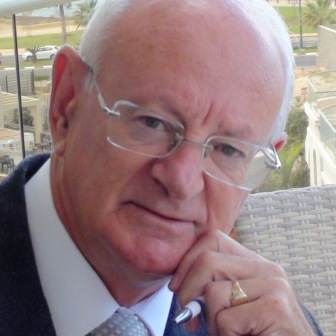
Featured Item

Bibi at UN: What he said and what he didn’t
BARRY SHAW
Following Benjamin Netanyahu’s bold but dark speech at the podium of the United Nations, he was more conciliatory with his remarks at the White House before he sat in a closed session with President Barack Obama.

RIGHT: BARRY SHAW
He reiterated his commitment to a peace vision of two states for two peoples. This statement drew a knee-jerk reaction from Economy Minister, Naftali Bennett, who insisted that the idea of a Palestinian state disappeared with the Hamas rocket and terror attacks we experienced this summer.
Truth be told, we have yet to hear any Palestinian leader echo the commitment to a two states for two peoples solution. It’s the “for two peoples” bit that is constantly lacking in their rhetoric. These missing words are the prime reason there can be no territorial withdrawal by Israel. But Bibi gave us a clue as to what he may have been thinking as he sat with Obama.
He spoke of thinking out of the box. He spoke of making use of “the new opportunities” and “a commonality of interests between Israel and leading Arab states.” He said we should “seize upon common interests and build positive progress to advance a more secure, prosperous and peaceful Middle East.”
Security for Israel, prosperity & peace for M-E
Netanyahu did not expound of where these common interests could lead us in regard to the Palestinian issue, but he did talk of the importance of the involvement of other regional players in finding a solution. And this brings us to surmise what alternative solution could give a better life for Palestinians, more security for Israel, and a prosperous and more peaceful Middle East.
Netanyahu does not need Bennett to lecture him about withdrawal from territories. Netanyahu resigned from the Sharon government over the Israeli withdrawal from Gaza. He warned what the results would be, and his prediction was justified by everything that has happened there ever since. When Israel’s Prime Minister speaks about his rock solid commitment to Israel’s national security and defence everyone, including Bennett, should take notice. Bibi will not retreat an inch in Judea & Samaria with a rejectionist and violent Palestinian leadership that will not change its stripes any day soon.
Palestinian state in Judea/Samaria won’t work
So what didn’t he say that fills the void in his optimistic future of hope? His mention of the involvement of Israel’s neighbours and regional players leads us into recalling the offer made by Egyptian President Sisi to grant large tracts of the Sinai for a new Palestinian state. This was immediately rejected by Mahmoud Abbas, but was this the last word? I think not.
Sisi would not have glibly mouthed these words based on nothing. It may have been a trial balloon but the offer is still out there. It is up to the major regional leaders to sit with Sisi and put flesh to the idea. The notion of a Palestinian state based in a connected Sinai-Gaza land mass should be seriously studied by the international community.
Once the reality that a Palestinian state in Judea & Samaria is out of the question, for a whole host of valid reasons, the Palestinians should be persuaded to seriously consider what, for them, will be an infinitely better solution.
The Egyptian initiative would offer growth space to absorb Arabs interested in a “right of return” into a new Sinai-Gaza Palestinian state. It would have access to the sea and potential for a port. It would have territory for tourism, agricultural, industrial, and residential development.
From a regional perspective, it would avoid the friction of a rejectionist Palestinian entity rubbing up against the Jewish State of Israel along indefensible borders. It would also ease the pressure for Jordan by having such an entity across the Red Sea and not over an embarrassing Israeli-held security buffer zone along the Jordan Valley or, failing that, a potential radical Islamic state across its western border.
Win-win-win-win solution for Palestinians
It would be a secure solution for both Egypt and Israel that would enable both of them, for mutual and separate reasons, to keep a defensive eye on a Palestinian state in such a location.
Let’s be clear about this. It is a win-win-win-win solution for Palestinians truly desirous of having their independent state, and for Israel’s, Egypt’s, and for Jordan’s political and security concerns.
It is a solution that merits the backing of the Arab League and international support led by President Barack Obama. The plan originated in Cairo. As such it is an Arab initiative.
Those who have supported a two-state solution based solely in Judea and Samaria and Gaza should think again, support the Egyptian initiative, and exert heavy diplomatic and economic persuasion on the Palestinian to go this new route.
Mahmoud Abbas gave a timeline of two years before he threatens to pursue further damaging steps that will get him nowhere and simply extend the conflict. The time can be used to show the Palestinian people the Sisi plan for a better and more prosperous future with the ability to build a far larger state than one envisioned in the restricted space of the West Bank.
These may have been the words that were missing from Bibi’s hopeful hints at the White House press conference.
- Barry Shaw is the delegitimisation consultant to the Strategic Dialogue Centre at Netanya Academic College. He is also the author of “Israel Reclaiming the Narrative”. www.israelnarrative.com




